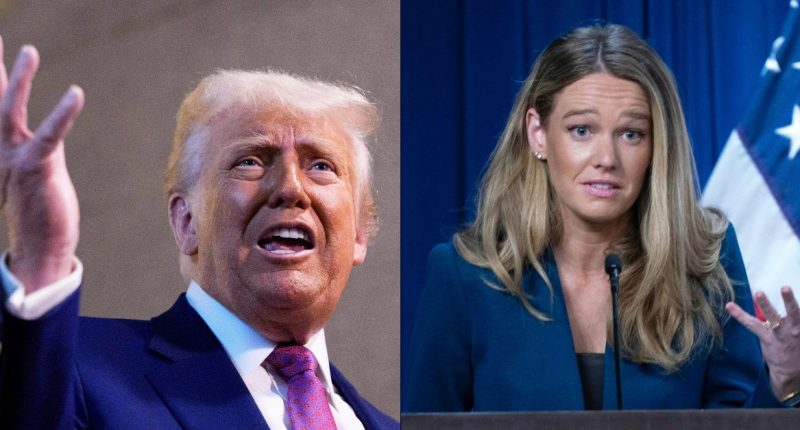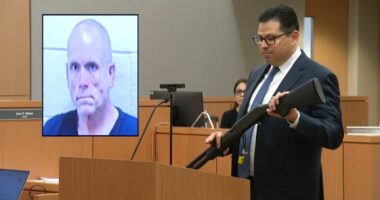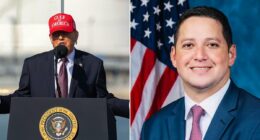Share this @internewscast.com
Left: President Donald Trump delivers remarks after attending a meeting with Congressional Republicans at the Capitol Building on Tuesday, May 20, 2025 (Aaron Schwartz/Sipa USA)(Sipa via AP Images). Right: DHS Assistant Secretary for Public Affairs Tricia McLaughlin addresses the media during a press briefing at ICE Headquarters in Washington, Wednesday, May 21, 2025 (AP Photo/Jose Luis Magana).
On Wednesday, the Trump administration continued its criticism of the judiciary with a direct critique of a federal judge in Massachusetts. This came after the judge ruled that the Department of Homeland Security (DHS) had breached his preliminary injunction by deporting several migrants to South Sudan — a nation none of the individuals were actually from — without providing due process or a fair chance to express their fears about the conflict-ridden place. The judge noted that this act might constitute criminal contempt of court.
Tricia McLaughlin, serving as the assistant secretary for public affairs at DHS, sharply criticized U.S. District Judge Brian E. Murphy. Earlier in the day, Judge Murphy had declared the administration’s expedited deportations of the migrants as “unquestionably violative” of his directive to ensure that detainees were given a “reasonable” chance at due process before being removed to a third country.
“This ruling is deranged. These depraved individuals have final deportation orders AND have all been convicted of heinous crimes,” McLaughlin wrote in a post to X, formerly Twitter. “A reminder of who was on this plane: murderers, child rapists, an individual who raped a mentally & physically disabled person.”
McLaughlin’s invective came after Murphy issued a two-page order explaining how to remedy the administration’s violation of his court order.
The judge ordered that each of the six men removed to South Sudan — all of whom remained onboard the plane in DHS custody as of yesterday evening — must be afforded reasonable fear interviews, counsel of their choosing, access to attorneys for the class of plaintiffs in the case, phone access, and technology “commensurate with the access they would receive were they in DHS custody within United States borders.”
Love true crime? Sign up for our newsletter, The Law&Crime Docket, to get the latest real-life crime stories delivered right to your inbox.
Additionally, Murphy ordered that the detainees be given “no fewer than 72-hours notice” of their reasonable fear interview. If DHS determines that a detainee’s fear “falls short of reasonable fear,” the detainee must be provided at least 15 days “to seek to move to reopen immigration proceedings to challenge the potential third-county removal.”
Under the order, DHS can return the migrants to the U.S. or provide such processes overseas, provided they are kept in conditions “commensurate to those the individuals would be housed in were they still in DHS custody within the United States.”
Prior to issuing his order, Murphy held an emergency hearing during which he harshly rebuked administration officials for seemingly ignoring the “long history” of legal precedent surrounding due process rights as well as recent orders from the U.S. Supreme Court regarding “reasonable” notice of removals.
“The department’s actions in this case are unquestionably violative of this court’s order,” Murphy said at Wednesday’s hearing. “It is plain to me that an ‘opportunity to be heard’ of only several hours that were not during business hours, where you couldn’t raise consult with your attorney or your family is insufficient. It was impossible for these people to have a meaningful opportunity to object to their removal to South Sudan.”
Murphy emphasized that even the Supreme Court justices recently confirmed that 24 hours of notice is “plainly insufficient” for the purpose of due process, stating, “I don’t see how anybody could think these people had a reasonable chance to object.” He also indicated that nearly every sensible person would be fearful of South Sudan, where violent crime and famine are endemic.
Shortly after the hearing, McLaughlin referred to Murphy as an “activist” judge, claiming he was fighting to bring “vicious criminals” back to the U.S. rather than simply enforcing federal law.
“We are removing these convicted criminals from American soil so they can never hurt another American victim. It is absurd that an activist judge is trying to force the United States to bring back these uniquely barbaric monsters who present a clear and present threat to the safety of the American people,” McLaughlin said in a statement. “We have given the media the names of these monsters. I implore the media to stop doing the bidding of these criminals and to tell the stories of innocent Americans who have been victimized.”
Murphy said he would decide whether the government’s actions were “criminally contemptuous” at a later date. A federal judge in Washington, D.C., has also threatened to hold the administration in criminal contempt for allegedly violating a court order by removing more than 100 Venezuelan nationals to a notorious terrorist prison in El Salvador without due process. That case remains ongoing.
Trump has also been scolded, though not by name, by Chief Justice John Roberts for the president’s repeated calls to impeach judges who have ruled against his political agenda.

















